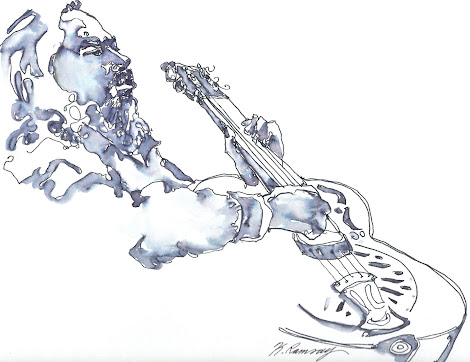 My friend, Kyle, passed this on to me and I gave it a listen and decided to review it. Now, I have to admit that, metal is like Celtic music, bluegrass, and opera for me: I'm just not that into it. If one of those styles are in your must-hear list, please hold your flames. And I'm not really including bands like Black Sabbath, Led Zeppelin, and Deep Purple because those seem more like mainstream rock bands to me. In any case, I'm laying out my perspective because I want to make clear that I don't quite have the context to critique this within the boundaries of style.
My friend, Kyle, passed this on to me and I gave it a listen and decided to review it. Now, I have to admit that, metal is like Celtic music, bluegrass, and opera for me: I'm just not that into it. If one of those styles are in your must-hear list, please hold your flames. And I'm not really including bands like Black Sabbath, Led Zeppelin, and Deep Purple because those seem more like mainstream rock bands to me. In any case, I'm laying out my perspective because I want to make clear that I don't quite have the context to critique this within the boundaries of style.After I listened to the Wishmaster, I did some research on Nightwish and they are generally described as symphonic power metal. To be fair, I had never even heard of that sub-genre, but I get the idea. For all of you other uninitiated (and link averse) people, symphonic (or opera) power metal is heavy metal music that has symphonic elements, often with signature female lead vocals and operatic or classical themes (thanks Wikipedia).
On the surface, Wishmaster hits the typical sound. The music is often quite theatrical, even a little overwrought. The vocals are a little reminiscent of opera. There are lots of keyboards and occasional orchestral accompaniment. The drums parts are rooted with staccato, rapid-fire bass drum kicks. The guitars provide a mix of crunchy rhythm punctuated with the piercing speed of sweep-picking. These last two aspects reminded me a lot of some of the Euro metal I've heard but never paid much attention to. Lyrically, the songs are very thematic and reference a sort of epic struggle.
Sleep Eden sleepThe deeper I listened to Wishmaster, though; it became less of a dry definition and revealed its nature. The vocals weren't really operatic but classically trained: more Annie Haslam (Renaissance) than Aida. In fact, the musical motif developments made me think of Renaissance a lot. These songs are classically influenced but maybe they're more shaped by movie soundtrack sensibilities. This would make sense: in some ways, soundtrack music is the modern classical (think John Williams). The album had quite a few progressive rock elements, too, which blur the genre line: so is a band like Porcupine Tree a little bit metal or is Nightwish a prog-rock band? They both have some similar elements. If I had to pick key feature of all of this, it would have to be the extensive use of dynamics to build a mood and tell a sonic story, within songs and through the album.
My fallen son
Slumber in peace
Cease the pain
Life`s just in vain
For us to gain
Nothing but all the same
The second track, The Kinslayer, is the song that triggered my prog-rock comparison. It has some very nice keyboard melody twinned with the guitar. This approach was used in a number of other songs, including the fourth cut, Wanderlust. Wanderlust sounded a lot like Trans-Siberian Orchestra (Wizards in Winter) to me. Wizards in Winter is the music you might have heard online, synched with incredible Christmas light displays.
Two For Tragedy (which I quoted above) is a great example of the similarities with modern soundtrack work. The music is slow and emotional , with crossing vocal parts. It builds in intensity, layering in instruments, culminating into a feeling of reflection in the aftermath of some overwhelming loss. This transitions into a faster paced, grindy orchestral sound in the title track, Wishmaster.
Tarja Turunen’s vocals are a rich soprano. She has a classically trained delivery that's a little odd in some of the more rock sounding tracks like Bare Grace Misery, but her voice is the defining element of the band for me. In a few places, they mix her vocal with a bit of a chorus effect and layer vocal takes together, so the impression is sort of an "Enya on steroids" kind of thing. Listen to the intro of Deep Silent Complete, for a great example (Two For Tragedy also has some of this element). This song was certainly my favorite track, but Dead Boy's Poem, with its spoken word sections, was also strong. Crownless rounds out my favorites from this album.
Overall, this is a very interesting album even for my non-metal ears. I was surprised that my wife (who's not much of a rock listener) also enjoyed Nightwish. I think this was probably because of the classical influences bringing in chordal complexity and strong dynamics that regular rock music misses out on.
I'm torn between recommending a strong, traditional mead (semi-sweet, light carbonation) or
something like Himbeergeist (a dry Raspberry schnapps). Either would stand up well to the music.

No comments:
Post a Comment